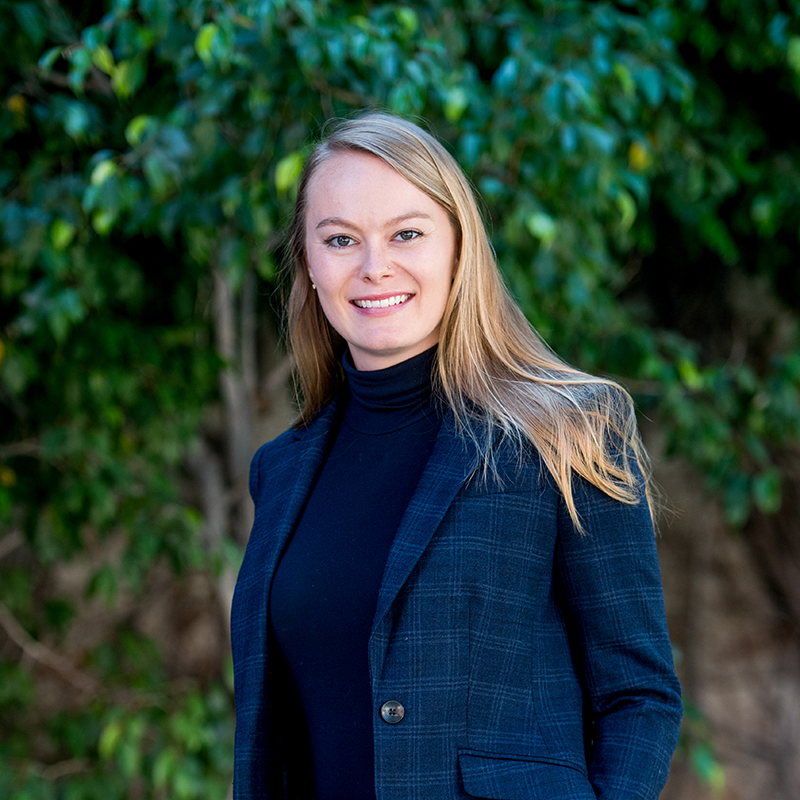From AI to Disability Rights, Future Established for 3rd-Year Student

As a third-year law student, Caroline Glennie-Smith '19 has focused on disability rights and disability law since her inception at Loyola Law School, Los Angeles. Glennie-Smith also finds herself interested in fast-emerging areas of technology such as artificial intelligence, blockchain and big data, and how they intersect with social justice issues.
"I enjoy working with my professors to discuss these developing areas of law and how they connect to other areas of law we cover in our general legal curricula," Glennie-Smith says. "Loyola encourages interdisciplinary thinking and exploration through the lens of the law, which has been a perfect fit for me and has allowed me to dive deep into different subject areas that interest me."
Glennie-Smith, who is fluent in Hindi and focused on South Asian art in college, has served as research assistant to Dean Michael Waterstone, helping with initiatives related to Loyola's Coelho Center for Disability Law, Policy & Innovation. She has continued as a research assistant to the Center's first director, Professor Katherine Pérez, helping with the Center's inaugural symposium and gala last fall.
"It has been a great experience to work with accomplished disability rights law scholars Dean Waterstone and Professor Pérez, learn from them and help the Center become established at Loyola,” says Glennie-Smith.
Glennie-Smith has pursued her wide-ranging interests in depth in semester-long projects and papers, writing about the political activism of people with disabilities in response to the then-proposed repeal of the Affordable Care Act. In spring 2018, she wrote two related papers about disability rights, big data and technology.
Outside the classroom, Glennie-Smith worked for the Los Angeles County District Attorney’s Office in the Preliminary Hearings and Trial units, which exposed her to government work and different aspects of litigation.
"This helped me in my Evidence, Constitutional Law and Criminal Procedure classes because I could connect my experiences working on and viewing cases at the DA's Office with the material we covered during these classes."
Glennie-Smith is also drawn to mediation and got involved in Loyola's Collaborative Family Mediation Clinic, where she worked with attorneys, accountants, mental health professionals and mediators during collaborative divorce mediation sessions.
"I learned so much from observing these professionals help clients discuss not only their legal and financial goals, but also their feelings and emotions that arose during the divorce process," she says.
Last spring, Glennie-Smith enrolled in Loyola’s inaugural Pro Se Mediation clinic, where she provided pro bono representation for a client during a mediation at the Department of Fair Employment and Housing.
"I assisted my client with a novel disability-related claim, for which there was only one published California court decision pertaining to my client’s issue,” she says. “It pushed me to be creative in analyzing California law and formulating my arguments for the mediation."
She says the mediation clinics helped her "become a more compassionate, mindful listener and communicator — skills I know will serve me well no matter what kind of law I practice."
Glennie-Smith also serves on the executive board of the Loyola of Los Angeles Entertainment Law Review as Chief Production Editor.
"I've learned a lot about teamwork and leadership, since this year I am responsible for overseeing the process of preparing three issues of the journal, which requires a lot of coordination and planning."
Last summer, Glennie-Smith gained additional experience in California civil rights law as a law clerk for a small firm specializing in disability rights and special education law, conducting research, interviewing clients and drafting complaints for cases involving discrimination in housing and hospital accessibility.
She also worked as a tutor in the Loyola Student Writing Tutors Program, helping students prepare writing samples for the on-campus interview process, and served as Vice Chair of OUTLaw, Loyola's LGTBQ student group, during her second year, overseeing the mentoring program.
"Loyola has helped prepare me for life post-law school by exposing me to various areas of law while providing opportunities to combine legal theory, research and writing with practical experiences that allow me to serve clients who need legal help,” Glennie-Smith says. Post-graduation, Glennie-Smith secured a federal judicial clerkship in the Central District of California. “Loyola's practice-oriented and social justice-focused approach to lawyering has been a perfect fit for me. I’m thrilled to begin my law career with a job that combines my passion for research and writing with public service.”